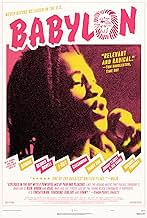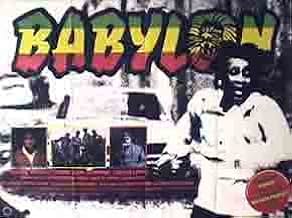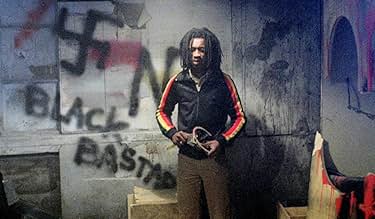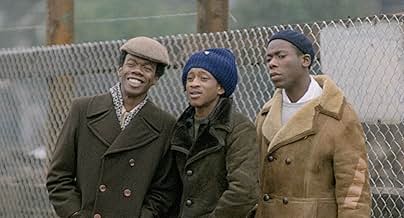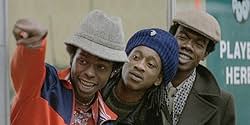Agrega una trama en tu idiomaThe movie centres around Brindsley Forde's character Blue. He fronts a reggae sound system based in South West London (Brixton). The film captures the trials and tribulations of young black ... Leer todoThe movie centres around Brindsley Forde's character Blue. He fronts a reggae sound system based in South West London (Brixton). The film captures the trials and tribulations of young black youths in troubled London in the early eighties.The movie centres around Brindsley Forde's character Blue. He fronts a reggae sound system based in South West London (Brixton). The film captures the trials and tribulations of young black youths in troubled London in the early eighties.
Beverley Michaels
- Elaine
- (as Beverly Michaels)
T-Bone Wilson
- Wesley
- (as T.Bone Wilson)
- Dirección
- Guionistas
- Todo el elenco y el equipo
- Producción, taquilla y más en IMDbPro
Argumento
¿Sabías que…?
- ErroresThis is likely to be a 'deliberate error by the film-makers', but in one scene you see two characters putting up a poster advertising a gig. The date shown is Saturday 23rd December (year unspecified). The nearest year that this date fell on was 1978, which is 2 years before the film was released. It is possible that various anachronisms in the film may occur due to this, for example release dates of records, or registration number plates of new cars.
- ConexionesReferences Alien, el octavo pasajero (1979)
- Bandas sonorasWarrior Charge
Performed by Aswad
Opinión destacada
Thank Margaret Thatcher for "Babylon", a tale of several West Indian youths living in a dank and dreary Great Britain. She's not mentioned in the film, but she might as well be the Bible's fork-tongued Whore of Babylon. Her city? London, to which the film's title alludes (Rastafarians and Christians use the word "Babylon" to refer to a corrupt and decadent society).
"Babylon" was directed by Franco Rosso, and was late to a wave of British films revolving around West Indians living in South London. The first of these was Horace Ove's "Pressure", also the first British film to be directed by a black director. Like "Pressure", "Babylon" is a gritty, neorealist account of black Londeners, chief among whom is Blue (played by reggae vocalist Brinsley Forde), a Rastafarian disc jockey who's trying to prepare for an upcoming music competition. Like the characters in "Pressure", Blue struggles with crime, racism, prejudice, violent slum life, personal and racial identity and finds the only positive outlet in his life – his music – repeatedly challenged.
The inter-war and postwar (1944-1962) years saw a huge increase in Caribbean migrants arriving in Britain. The first of these were lured over to fight in World War 2 (tens of thousands of West Indians were recruited for service in the RAF and Royal Navy), work in industries and agriculture, all sectors which were facing serious labour shortages. These shortages were only partly met by the recruitment of women and Irish workers. During the long, post-war Eropean economic boom, which was fuelled by reconstruction and American investment, immigration then began to further increase, leading to the creation of substantial immigrant communities in and around London. This, of course, led to frictions with the white working class, which culminated in the riots of the 1950s, in which white gangs such as the Teddy Boys clashed with black immigrant families. Far right groups, unions and the left would all exploit these conflicts. "Pressure" and "Babylon", made in the late 1970s, were themselves released in the wake of a second wave of Nottingham riots.
Unlike most films in its wave, "Babylon" has a certain aesthetic punch (traces of "Saturday Night Fever"). The film is packed with smooth Reggae tunes and seems to take place in an everlasting night, with eye popping lights and fluorescent colours languishing behind a blanket of perpetual cigarette smoke. It's a moody, easy going film, captures well the London club scene of the 1970s, the brutalist hell of concrete-London, and offers a rare glimpse into the lives of an oft neglected community (black, West Indian South Londoners). On the flip-side, the film's writing is obvious and too direct, a trait typical of even classic neorealist works; what you see is what you get.
Uniquely, the film eschews Jamaican and West Indian gangland culture in favour for focusing on the implicit radicalism of reggae. Reggae always was protest music, its fire the fire of the mobs. It didn't quite last, though. Protest music declined in the early 1980s, with the deaths of Marley, Lennon and the slow collapse of punk. Reggae then essentially became stoner and sex music, as roots reggae transformed into dance-hall.
Before this, reggae was a force. The best reggae had the proselytising fury of Dylan, to which groups like Burning Spear, The Abyssinians or dub-poet Linton Johnson inserted their own Rastafarian or political beliefs. This "spiritual" dimension gave the genre a Utopian, almost philosophical tinge; the desire for change "through" music. Indeed, albums were oft given provocative titles like "Confrontation" and "Uprising", lyrics were openly agitprop ("Come we go chant down Babyon one mo' time!") and even album art would feature dread-locked warrior-heroes (the Rasta's dreadlocks were oft likened to the manes of the lion of Judah) slaying monstrous "Babylon Dragons". "Babylon" itself ends with a singer chanting "we can't take no more of that!", a protest which is inter-cut with shots of police officers kicking down doors (the film was banned because censors feared that it would incite riots). There's a simplicity to the film's politics - things boil down to a very simple, noir existentialism ("The city's not right and we want out!") - but also a sense of raw, truthful anger.
Horace Ove's "Pressure" is an even more interesting snapshot, thanks largely to its low budget, which necessitated the casting of many non actors. Trinidadian born Ove (pronounced "O-vay") was heavily influenced by Italian neorealists, and used heavy improvisation and cinema-verite techniques to convey life in 1970s West London. Like "Babylon" the focus is on young, black West Indians, most of whom are second generation migrants and all of whom struggle with issues of cultural identity, institutional racism and cultural preservation. The film's central character is a kid called Tony who is radicalised by his brother, a black activist. Much of the film deals with the problems of employment, alienation, white power structures, inextricable class/race linkages, and the assimilation or mutation of cultural values (the immigrant's changing taste in food, music, culture, beliefs etc). Some of the film's more daring moments align Christianity itself with racism, in which, for example, men of power use "black" as a metaphor for sin and tout "white" as being synonymous with holiness. Like many neorealist works, much of the film consists of "stolen footage", many of those appearing on screen not realising they are on camera or attending staged rallies. Like "Babylon", indeed like most neorealist works, "Pressure" has a certain obviousness about it. These films are best appreciated as time capsules; historical totem poles. In a sense, the mark the birth of Thatcherism. Thatcher, of course, was elected as leader of the Conservative party in 1975, and quickly set about removing certain safeguards for citizens in favour for an emphasis on "individual responsibility" and "private initiative", all the while presiding over the "managed decline" of several segments of society. She was good with code words.
8/10
"Babylon" was directed by Franco Rosso, and was late to a wave of British films revolving around West Indians living in South London. The first of these was Horace Ove's "Pressure", also the first British film to be directed by a black director. Like "Pressure", "Babylon" is a gritty, neorealist account of black Londeners, chief among whom is Blue (played by reggae vocalist Brinsley Forde), a Rastafarian disc jockey who's trying to prepare for an upcoming music competition. Like the characters in "Pressure", Blue struggles with crime, racism, prejudice, violent slum life, personal and racial identity and finds the only positive outlet in his life – his music – repeatedly challenged.
The inter-war and postwar (1944-1962) years saw a huge increase in Caribbean migrants arriving in Britain. The first of these were lured over to fight in World War 2 (tens of thousands of West Indians were recruited for service in the RAF and Royal Navy), work in industries and agriculture, all sectors which were facing serious labour shortages. These shortages were only partly met by the recruitment of women and Irish workers. During the long, post-war Eropean economic boom, which was fuelled by reconstruction and American investment, immigration then began to further increase, leading to the creation of substantial immigrant communities in and around London. This, of course, led to frictions with the white working class, which culminated in the riots of the 1950s, in which white gangs such as the Teddy Boys clashed with black immigrant families. Far right groups, unions and the left would all exploit these conflicts. "Pressure" and "Babylon", made in the late 1970s, were themselves released in the wake of a second wave of Nottingham riots.
Unlike most films in its wave, "Babylon" has a certain aesthetic punch (traces of "Saturday Night Fever"). The film is packed with smooth Reggae tunes and seems to take place in an everlasting night, with eye popping lights and fluorescent colours languishing behind a blanket of perpetual cigarette smoke. It's a moody, easy going film, captures well the London club scene of the 1970s, the brutalist hell of concrete-London, and offers a rare glimpse into the lives of an oft neglected community (black, West Indian South Londoners). On the flip-side, the film's writing is obvious and too direct, a trait typical of even classic neorealist works; what you see is what you get.
Uniquely, the film eschews Jamaican and West Indian gangland culture in favour for focusing on the implicit radicalism of reggae. Reggae always was protest music, its fire the fire of the mobs. It didn't quite last, though. Protest music declined in the early 1980s, with the deaths of Marley, Lennon and the slow collapse of punk. Reggae then essentially became stoner and sex music, as roots reggae transformed into dance-hall.
Before this, reggae was a force. The best reggae had the proselytising fury of Dylan, to which groups like Burning Spear, The Abyssinians or dub-poet Linton Johnson inserted their own Rastafarian or political beliefs. This "spiritual" dimension gave the genre a Utopian, almost philosophical tinge; the desire for change "through" music. Indeed, albums were oft given provocative titles like "Confrontation" and "Uprising", lyrics were openly agitprop ("Come we go chant down Babyon one mo' time!") and even album art would feature dread-locked warrior-heroes (the Rasta's dreadlocks were oft likened to the manes of the lion of Judah) slaying monstrous "Babylon Dragons". "Babylon" itself ends with a singer chanting "we can't take no more of that!", a protest which is inter-cut with shots of police officers kicking down doors (the film was banned because censors feared that it would incite riots). There's a simplicity to the film's politics - things boil down to a very simple, noir existentialism ("The city's not right and we want out!") - but also a sense of raw, truthful anger.
Horace Ove's "Pressure" is an even more interesting snapshot, thanks largely to its low budget, which necessitated the casting of many non actors. Trinidadian born Ove (pronounced "O-vay") was heavily influenced by Italian neorealists, and used heavy improvisation and cinema-verite techniques to convey life in 1970s West London. Like "Babylon" the focus is on young, black West Indians, most of whom are second generation migrants and all of whom struggle with issues of cultural identity, institutional racism and cultural preservation. The film's central character is a kid called Tony who is radicalised by his brother, a black activist. Much of the film deals with the problems of employment, alienation, white power structures, inextricable class/race linkages, and the assimilation or mutation of cultural values (the immigrant's changing taste in food, music, culture, beliefs etc). Some of the film's more daring moments align Christianity itself with racism, in which, for example, men of power use "black" as a metaphor for sin and tout "white" as being synonymous with holiness. Like many neorealist works, much of the film consists of "stolen footage", many of those appearing on screen not realising they are on camera or attending staged rallies. Like "Babylon", indeed like most neorealist works, "Pressure" has a certain obviousness about it. These films are best appreciated as time capsules; historical totem poles. In a sense, the mark the birth of Thatcherism. Thatcher, of course, was elected as leader of the Conservative party in 1975, and quickly set about removing certain safeguards for citizens in favour for an emphasis on "individual responsibility" and "private initiative", all the while presiding over the "managed decline" of several segments of society. She was good with code words.
8/10
- tieman64
- 13 may 2012
- Enlace permanente
Selecciones populares
Inicia sesión para calificar y agrega a la lista de videos para obtener recomendaciones personalizadas
- How long is Babylon?Con tecnología de Alexa
Detalles
Taquilla
- Total en EE. UU. y Canadá
- USD 109,749
- Fin de semana de estreno en EE. UU. y Canadá
- USD 21,214
- 10 mar 2019
- Total a nivel mundial
- USD 111,456
- Tiempo de ejecución1 hora 35 minutos
- Mezcla de sonido
- Relación de aspecto
- 1.85 : 1
Contribuir a esta página
Sugiere una edición o agrega el contenido que falta

Principales brechas de datos
By what name was Babylon (1980) officially released in India in English?
Responda


